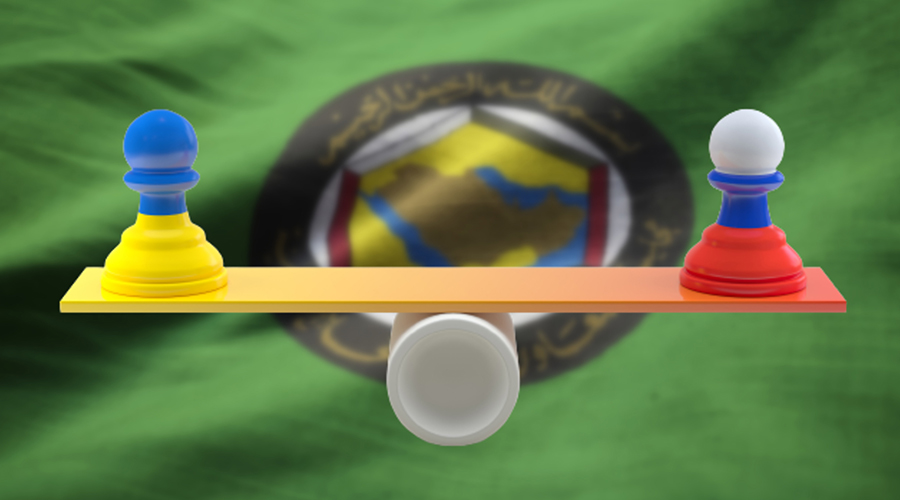The crisis in Ukraine have put the Gulf Cooperation Countries (GCC), like many others, to a difficult test. Despite the challenge, the GCC countries have remained true to their principles and have called for self-restrain and diplomacy in accordance with international laws and the UN charters. Such stance by the Gulf states is driven by a deep conviction that belligerents must wholly avoid any further bloodshed and violence. As the GCC navigate a truly global crisis, the international community follow closely with particular interest. In this article we take a close look into how the war in Ukraine has affected the Gulf region, its implications, and the GCC states’ political principles dealing with it.
Influencing Contexts
The war in Ukraine has been profoundly divisive. While the international community fails to take a consistent and clear position on Russia’s military operation, the GCC states fully realise the sensitive position in which they find themselves having to craft a political and diplomatic position that does not compromise their interests. Several factors may be considered, as follows:
1. GCC’s strong and growing relations with both sides: Russia on the one hand, and Ukraine and the West on the other. The GCC hold strategic trade and energy relations with both camps, and they need to strike a fine balance to avoid any unnecessary damage to these ongoing relations.
2. The stance of the GCC region towards Russo-Ukrainian War crisis has placed the historical morals and beliefs that define the GCC foreign policy under scrutiny.
3. The GCC is the biggest energy exporter in the world. KSA, the UAE, and Kuwait are key members of OPEC+ and are mindful of the volatile nature of global energy markets in times of crisis. Seeking to avoid disruption for both producers and consumers, they have opted for restrain instead of escalation under these risky climates.
Hedging Strategy
Considering the above, the Gulf Arab states are affirming their belief in the importance of respecting international law and resorting to diplomatic dialogue. This approach may be the most rational to preserving their international credibility as effective mediators to help reach a political resolution out of this Russian–West deadlock. Last February, the UAE abstained in a UN Security Council vote on the US-Albanian draft resolution, explaining that taking sides would only fuel the global polarisation and lead to more violence.
The Gulf Arab states aim to maintain balanced relations with major global powers, keeping in sights regional strategic interests. The growing relations with Russian and China in recent years do not necessarily replace the long and deep alliance between the Gulf and Washington. Reflecting diplomatic transparency and firm belief in international cooperation, the GCC states’ strategy is centred on political flexibility and finding common grounds with all their partners.
Therefore, strengthening relations with Russia and China does not take away from a strategic partnership with the US and other western countries. Relations emerge as new global geopolitics pivot and security needs arise, and they do not undermine existing alliances with the States and the West. GCC Leaders’ vision is to ensure sustainable cooperation and partnership that drive economic and social growth for the Gulf region and the rest of the Middle East.
Diplomatic Flexibility
The developing relations with US and Russia in recent years indicate unique ability by the GCC countries to remain flexible and keep enough space to navigate intertwined and complex partnerships. On the one hand, Washington is a key strategic ally who understands the GCC’s role in geopolitical stability of the Middle East, and therefore wants to avoid a scenario that leads to direct political conflict. On the other hand, Gulf Arab states share key interests with Russia and China in areas of energy, security, and tourism. At any rate, the Gulf states do not want to risk their economic and security interests with any of the opposing camps and instead aspire to pursue a ‘win-win’ strategy that bear fruit to all strategic partners.
Recent political analysis literature claim that the Gulf Arab states have been diverging from reactive foreign policy to becoming more actively involved in the region. Yet a closer examination into the economies and politics of these states reveal distinctive agility and capacity to deal with emerging geopolitics proactively and effectively. It is therefore not a shift in foreign policy, rather the ability to navigate an ever increasingly complex global politics.
Gulf Principles
The Gulf Arab states in dealing with the crisis in Ukraine have not departed from previously held strategy, nor does it indicate a change in priority or shift in alliances. Rather, it reflects a realistic reading of the geopolitical shifts taking place on the international stage, and the changes influencing the global balance of power. It affirms the Gulf Arab states’ proactive approach to regional and international crisis as they emerge, and their ability to navigate a complex web of relations with strategic partners that carry high economic and political stakes. The outcome is a series of calculated steps that ensures strategic interests and relations are protected.
Gulf leaders also aim to protect the rapidly growing development taking place in their countries. As great power polarisation takes place, the GCC’s main priority is to maintain security and stability in a highly unpredictable region; the only way to achieving this is through cooperation and diplomacy in areas that would drive development performance and metrics in key sectors.


